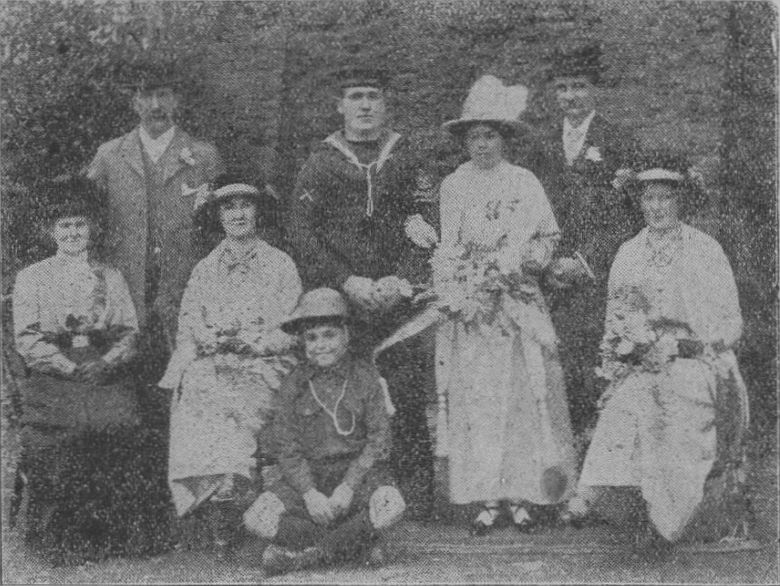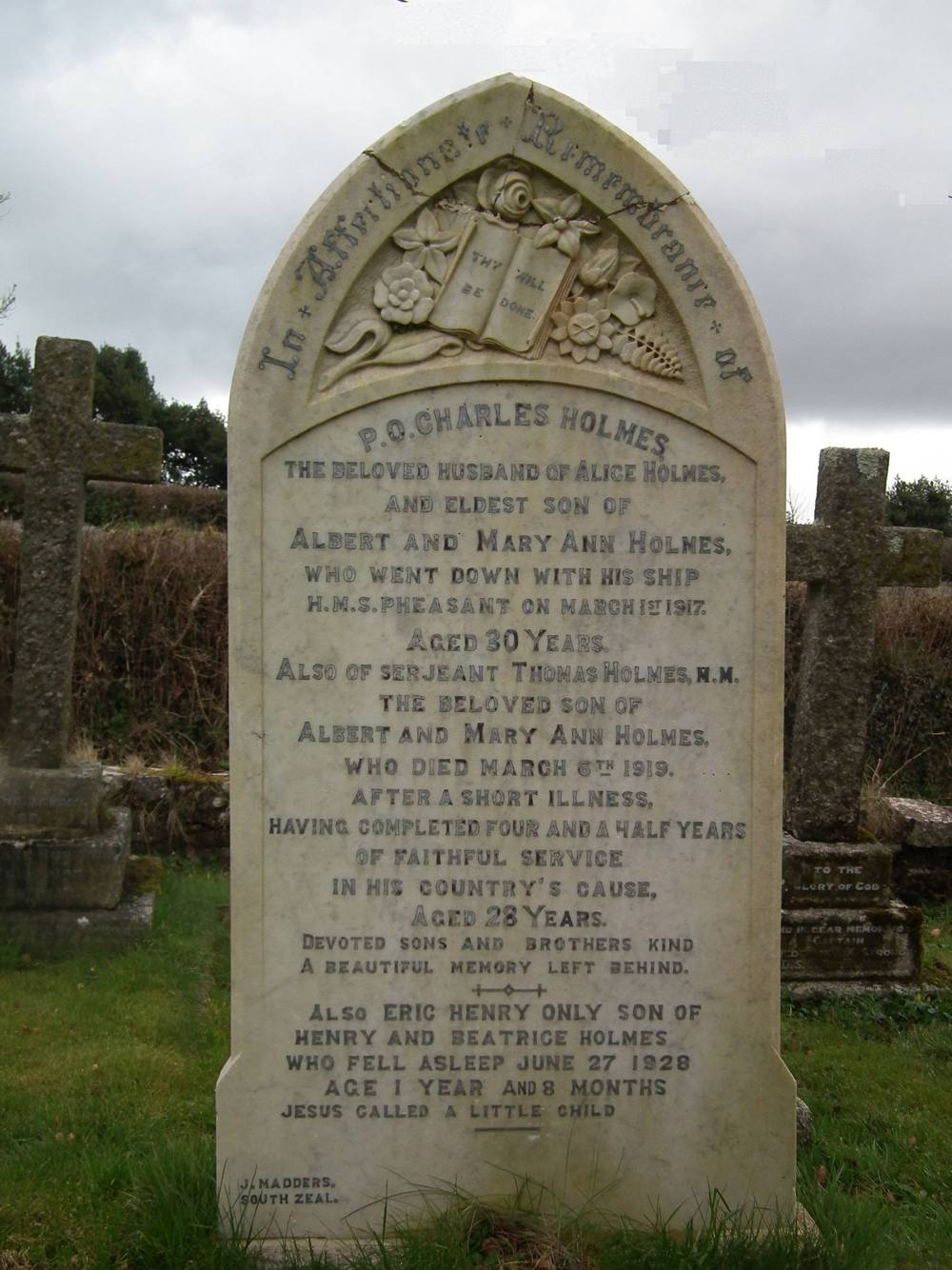The Great War 1914-1918
The Holmes Family of Railway Cottage, near Bow
Born in Talaton, near Honiton, married in London, Albert Holmes, his wife and family moved to Bow in about 1897. They lived at the Railway Cottage, near the railway line at Thorne, actually in Clannaborough parish. He was a foreman plate layer with the Southern Railway. They had four sons and a daughter. The family made their home in Bow for nearly 50 years.
Their eldest son, Charley, joined the Royal Navy when he was 12 and became a Petty Officer. On 18 March 1916, aged 28, he married Miss Alice Pratt in Bow Church. The ceremony was conducted by Rev E Stanley Phillips, who was later to lose a son in the war. She was 8 years older, came from Wiltshire but had been staying at Collatons in Bow.
The bride was dressed in silver grey and wore a stole of Maltese Lace (a gift of the bridegroom) and a silver grey hat with a white ostrich plume.The wedding cake was cut with a Turkish sword that he had captured at the Dardanelles.

He returned to his ship after a week's leave.
Just under a year later, on 1 March 1917, the ship on which he was serving, HMS Pheasant, struck a mine (possibly laid by a German submarine) near the Orkneys. There were no survivors.
Charley's younger brother, Tom, had joined the Royal Engineers in 1913 and during the war served in France.
In February 1915 he sent home souvenirs from the front including a German Helmet, revolver and binoculars which he had collected “in a scrap” and which were displayed in Bow post office.
The following interesting letter from the front has been received from Corpl. Tom Holmes of Bow. [March 1915]
Dear Mother and Father,--I now take the pleasure writing you a nice long letter to tell you of some my goings since I have been out here. The first battle we took part in was at Mons on the 23rd August. We knew the Germans were about there, so we entrenched, and we were going to put barbed wire in front the trench. About five o'clock we had such a hail of shrapnel burst over us which sent us looking for cover. We got four wounded there. That was the place were L Battery got their V.C. In the morning we had to retire as they were about eight to one against us. We had carry on with the retirement for fourteen days, covering about 200 miles, and to fight as went back to keep the German cavalry from cutting us all up. We got back within ten miles of Paris, then we got in line with the French. Then we started to advance, and kept it up till we got to the Aisne, which we had to bridge under heavy shell fire, but we did it, and got all the troops across. On the 14th of September one our section was working a bridge when a shell dropped in the middle of them, killed the officer and one sapper. One corporal had his arm blown off, and a driver had his leg blown off, both died later, and ten others were wounded. Eight horses were killed out of nine. That was the day before my birthday. We stayed there a month, and then we were relieved by the French, and had two days in the train and rushed Calais. From there went to St. Omar, and we fought our way to Ypres, where you can see in the papers we had such hard fighting, and we did get it too, but everything put front of us would not turn us. I have seen men blown clean out the trenches with "Jack Johnson's," and then get up and go back. It was terrible. I have heard men who have been through the South African campaign, say that there were more shells fired here in one day that there was in that campaign. I heard a gunner say one day that their battery fired nearly 2,000 shells, and we had about six batteries around us. Up to the present our company has lost about 100 men and eight officers. I have had three narrow escapes. "Jack Johnsons" dropped by me three times and knocked me down and stunned me twice. By its explosion it makes a hole big enough to put a waggon in, and you would not able to see it. Our chief job was to put barbed wire in front of the trenches, which we had to do by night, and always had someone firing at us. We call them snipers, and they would be on all night. I have been as close to the enemy as the garden gate from the front door at home, and laced wire between the trees and made entanglements for our troops. Our infantry says we have got the worst job the lot. Sometimes they would see us and start to fire. We would have to lie down as fiat as we could until they stopped. We did not get many men hit at the job. We used go out every night to do something. We used get a sleep through the day sometimes if the shelling was not too bad. It was not safe in a house. While they were shelling there was hardly a house standing. We had to dig holes in the ground and sleep in them. We could get plenty of straw. On the 14th of this month we had been out all night putting barbed wire in front of the Staffordshire Regiment, and returned about five the morning. We had only time to have our breakfast when our officers came in the door and ordered all to fall in and get 150 rounds of ammunition each. We had to man the trench. The French had retired because the shell fire was too hot. We got up to the trench about 7 o'clock, and could see the Germans coming up the hill in hundreds. We put a terrible storm of bullets into them. Our ammunition only lasted about half hour, so we got two boxes from the infantry, 8,000 in each. The bolts of our rifles got so hot we had to kick them back to take out the empty cartridge. They came within 450 yards of us, and got in a trench. Then our artillery started on them. We could not hear each other speak, and they were blowing them out of the trenches. As they came out we would have a pop at them. We did not let many of them go back. We had a fine day. The best bit of sport we had. We lost two of our officers, and there were only fifty of us left. I have killed my share if do not have another chance. We left the trenches on the 20th for a rest, the only one have had since we have been out here, and I don't think are going back for a bit unless pushed. If we have to go up again we can do it and with a good heart. It seems a bit quiet back here. We are about 15 miles from the firing line. I was glad to hear had Charlie home with you for an hour or two. It will help to cheer you up a bit. I should like to be able do the same, but I don't care how long it lasts as long as I am spared to see the old homestead again. We are staying in a farm now, and can get milk and butter and some pork. It is a bit rough, but what do we farmers care. We are a lot happier than you think, so you must not worry. When we are working at night we all get round before we go out and have a few of the old songs. Our officers used to say were a fine lot of singers. One of the Germans biggest days for fighting Sunday, and Tuesday comes next, and they always seem to fight harder on those two days. I must say goodbye now, from your loving son, Tom.
In June 1916, when an acting serjeant, he was awarded the Military Medal.
He was gassed once during the war, and demobilised in February 1919.
Two weeks after returning home, he developed influenza. Pneumonia set in and he died in Bow on 6th March, aged 28.

Memorial to the Holmes family in Bow Churchyard.
"Devoted sons and brothers kind
A beautiful memory left behind"
(Also mentioned is Eric Henry Holmes, the son of Albert and Mary's third son. He drowned in a stream at the bottom of his parents' garden when a toddler.)
